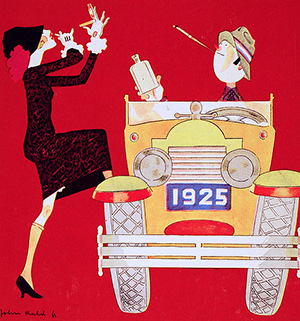Dialogue & Initiative 2012 The new annual edition of our journal of discussion and analysis is now out. More than 130 pages, it includes 13 articles related to the Occupy! movement, as well as seven others vital to study in this election year. Cost is $10 plus shipping. Or get one by becoming a sustainer. Click the title to buy it directly.
|
New Issue of Mobilizer

Check out what CCDS has been doing...
|
Blog of the Week: Fast Company

Martin Scorsese's Film School: The 85 Films You Need To See To Know Anything About Film
|
Lost Writings of SDS..
Revolutionary Youth the the New Working Class: The Praxis Papers, the Port Authority Statement, the RYM Documents and other Lost Writings of SDS
Edited by Carl Davidson 
Changemaker, 273pp, $22.50
For the full contents, click the link and view 'Preview' under the cover graphic.
|
|
By Randy Shannon, CCDS

"Everyone has the right to work, to free of employment, to just and favorable conditions of work and to protection against unemployment."
- United Nations Universal Declaration of Human Rights, December 10, 1948
I. Introduction
The "Great Recession" that began in 2007 has caused the greatest percent of job losses since the Great Depression of 1929. This crisis is the end of an era of unrestrained 'neo-liberal' capitalism that became public policy during the Reagan administration. The crisis marks a new level of instability with the growth of a global financial elite that targeted US workers and our trade unions after World War II.
|
|
Order Our
Full Employment Booklets
 |
...In a new and updated 2nd Edition
Capitalism may well collapse under its own excesses, but what would one propose to replace it? Margaret Thatcher's mantra was TINA...There Is No Alternative. David Schweickart's vision of "Economic Democracy" proposes a serious alternative. Even more fundamentally, it opens the door to thinking about alternatives. His may or may not turn out to be the definitive "successor system," but he is a leader in breaking out of the box. |
|
Quick Links...
CCDS Discussion |
Sex and the Automobile in the Jazz Age

By Peter Ling in History Today: 'Brothels on wheels' thundered the moralists but Peter Ling argues the advent of mass motoring in the 1920s was only one of the changes in social and group relationships that made easier the pursuit of carnal desire.
|
 A Memoir of the 1960s by Paul KrehbielAutumn Leaf Press, $25.64 A Memoir of the 1960s by Paul KrehbielAutumn Leaf Press, $25.64 | | Shades of Justice Video: Bringing Down a President, Ending a War |
|
Carl Davidson's Latest Book:
New Paths to Socialism

Essays on Mondragon, Marx, Gramsci and the Green and Solidarity Economies |
Solidarity Economy:What It's All About

Edited by Jenna Allard, Carl Davidson and Julie Matthaei
Buy it here...
|

Voices from the Underground Press of the 1960s, Part 2- Foreword by Susan Brownmiller
- Preface by Ken Wachsberger
$37.50 + $6 shipping
|
|
Discussion Documents for a Militant Movement

By Don Hamerquist
|
|
|
|
An Invitation to CCDSers and Friends...
 Job Creation is Key, Not Deficit Reduction
We're the Committees of Correspondence for Democracy and Socialism...Do you have friends who should see this? Pass it on...Do you have a blog of your own? Others you love to read every day? Well, this is a place where you can share access to them with the rest of your comrades. Just pick your greatest hits for the week and send them to us at carld717@gmail.com!
Most of all, it's urgent that you defend voter rights, plan for 2014 races now, oppose austerity, make solidarity with the Occupy! movement and end the wars! We're doing more than ever, and have big plans. So pay your dues, make a donation and become a sustainer. Do it Now! Check the link at the bottom...
|
Makes Jobs Not Wars
 Sign Petitions, Organize 'Street Heat' Sign Petitions, Organize 'Street Heat'
By RootsAction
Rootsaction.org
The "fiscal cliff" deal was not all bad. Social Security and Medicare weren't cut. Unemployment benefits were extended. Taxes went up a tiny bit on some of the wealthiest.
But Pentagon spending remained outrageously high, giveaways to corporations were enormous, the President went back on his commitment to end tax cuts for more of the wealthiest, the deal raised taxes on people making $20-200K per year more than on those making $200-500K, and the debt ceiling limit remained -- setting up a big push to cut Social Security and Medicare in the coming months.
No deal at all would have been better than this one. Had the "Bush" tax cuts expired, the good parts of this deal could have been passed.
We must now work to take the focus off the deficit and put it on jobs and smart public investment. That means moving the money away from war preparations. Please sign this petition. The greater the number of signers, the greater use we will be able to make of it in influencing the coming showdown....(Click title for more)
|
|
An Ugly Deal: 4 Reasons the 'Fiscal Cliff'
Deal Is Worse Than It Looks

By Robert Borosage
Beaver County Blue via OurFuture.org
Jan 1, 2013 - Early this morning, the Senate passed the fiscal cliff deal by 89-8, a margin virtually guaranteeing that it will survive in the House. The deal has some good parts. It lets the Bush tax cuts expire on the wealthy, raises the estate tax marginally and increases taxes on capital gains and dividends a bit. Unemployment benefits are extended for a year. Tax boosts for the low paid workers - the child tax credit, expanded earned income credit, refundable tuition tax credits - are extended, if only for five years. Social Security, Medicare and Medicaid are not touched.
But no one should be fooled. This is an ugly deal, with foul implications for the coming months.
1. Setting Up the Next Extortion
The most ominous part of the deal is what was left out. The deal makes no provision for lifting the debt ceiling. It postpones the sequester (automatic cuts in domestic and military spending) for only two months. It is a smaller deficit reduction package than that originally sought by the president. It therefore sets up the right-wing House zealots to hold the economy hostage once more, while demanding deep cuts in public services (known as cuts in domestic spending), backed by a media frenzy about deficits. And while Social Security, Medicare and Medicaid escaped unscathed in this deal, they will be the prime targets in the coming debate.
2. Hiking Taxes for Working Americans; A Million Jobs Lost
By allowing the payroll tax cut to expire, every working American gets a tax hike of 2% of their income (up to about $113,000 in income). A worker making $50,000 a year will pay an extra $1,000 in taxes. Payroll checks will be cut. Belts will have to be tightened even more. That will lower demand, producing job loss totaling up to an estimated million jobs. (Taxes on the wealthy go up also, but those have only marginal effects on jobs).
3. Compromising the Compromising President
President Obama sensibly told Republicans that he would not sign any bill or agree to any deal that extended the Bush tax cuts on those making over $250,000. He had stumped on that across the country on this pledge and received a mandate from the voters. Polls showed the majority of Americans were with him. With all the Bush tax breaks due to expire, Republicans were faced with letting taxes go up on everyone just to defend tax breaks for the richest Americans. The President began the negotiations saying this was not negotiable. He could not have been in a stronger position. ...(Click title for more)
|
Last Year in Review: Ten of My
Favorite Things about 2012

By Medea Benjamin
Common Dreams
There are many things to be thankful for in 2012, starting with the fact that the world didn't end on December 21 and that we don't have to witness the inauguration of Mr. One-Percent Mitt Romney. The global economic crisis continued to hit hard, but people have been taking to the streets around the world, from students in Chile to indigenous activists in Canada to anti-austerity workers in Europe. And while the excitement of the Arab world uprisings has been tempered by divisions and losses, the struggles are far from over.
Here are some US and global issues that experienced newfound gains in 2012.
1. While conservatives launched vicious attacks on women's rights, it backfired-and fired up the pro-choice base! US voters elected the highest number of women to Congress ever, including the first openly lesbian senator (Tammy Baldwin), the first Asian-American senator (Mazie Hirono) and first senator to make the banks tremble, Elizabeth Warren! Voters also rejected 4 crazy candidates who called for limiting a woman's right to choose-including the resounding defeat by Missouri Senator Claire McCaskill over Mr. Legitimate Rape Todd Akin. Don't forget that when Susan G. Komen for the Cure announced it would no longer fund Planned Parenthood, it got so heartily trounced that it caved in than seventy-two hours later. And stay tuned for the 2013 global women rising-a billion of us demanding an end to violence against women on February 14!
2. Immigrant rights groups, especially young Latinos, mobilized and took great risks to force a change in attitude-and a thaw in policy. They fasted and caravanned and marched and knocked on doors. They pushed the administration and in June, just before the election, President Obama announced a new immigration policy that allows some undocumented students to avoid deportation and receive work authorization when they apply for deferred action. While not nearly enough, especially in light of this administration's record rate of deportations, a mobilized immigrant community with significant voting power stands poised to make more impactful changes in U.S. immigration policy next year.
3. More money flooded the elections than ever before (some $5.8 billion!), but most of it went down a big, black hole-and unleashed a new movement for money out of politics. Billionaires wasted fortunes trying to sell lousy candidates and lousy ideas. Looking at the candidates supported by the biggest moneybags of all, Sheldon Adelson, NONE were elected to office. Right-wing "pundits" like Karl Rove proved themselves to be idiotic partisan hacks and the Tea Party has been tearing itself apart. But best of all, from Massachusetts to Oregon, Colorado to Illinois and Wisconsin, and Ohio to California, citizens throughout the country voted overwhelmingly for their legislators to pass a constitutional amendment to overturn the U.S. Supreme Court's Citizens United v. Federal Election Commission ruling and declare that only human beings - not corporations - are entitled to constitutional rights and that money is not speech and campaign spending can be regulated....(Click title for more)
|
Jon Fromer, 1946-2012, Presente!
 | | CCDS's Jon Fromer 'Gonna Take Us All' |
|
Race, Class, Violence and Denial:
Mass Murder and the Pathologies of Privilege

By Tim Wise
DailyKOS
The senselessness alone would have been sufficient.
So too the sheer horror.
The devastated families, the tapestry of their lives ripped apart, would have been more than enough to make the events at Sandy Hook Elementary almost too weighty to bear.
Much as they were more than a decade before at Columbine, or in any number of other mass or spree shootings -- over five dozen by one count, more than 150 by another -- that have played out over the past few decades.*
There is nothing, one would hope (and even suspect) that could make the present moment any worse.
And yet sadly, there is, and it is something that one hears almost every time one of these tragedies transpires. Over and again, no matter how frequently they happen, and no matter how often the specifics of the latest event eerily mirror the last one and the one before that -- the high capacity weaponry, the apparent mental and emotional instability of the shooter, and the relatively bucolic surroundings of the locale where the deed is done -- it is said again and again with no sense of irony or misgiving.
And it is maddening.
"This wasn't supposed to happen here."
Or perhaps, "No one could have imagined something like this happening in our community."
Or even worse, "This is a nice, safe place," which of course was the same thing said about Springfield, Oregon, Pearl, Mississippi, Littleton and Aurora, Colorado, Moses Lake, Washington, Jonesboro, Arkansas, Santee, California, Edinboro, Pennsylvania, Paduchah, Kentucky, and pretty much every one of the dozens of places where the things that never happen appear to happen regularly enough to constitute something well North of never; indeed quite a bit up from rare....(Click title for more)
|
Lenin and Luxemburg Through Each Other's Eyes

August Thalheimer, a revolutionary who knew and worked with both of them, insisted on the formulation "not Luxemburg or Lenin - but Luxemburg and Lenin", explaining that "each of them gave ... what the other did not, and could not, give".
By Paul Le Blanc
Links International
(Talk presented at the International Conference on "Lenin's Thought in the Twenty-First Century: Interpretation and Its Value", Wuhan University, October 20-22, 2012.)
January 3, 2013 - Links International Journal of Socialist Renewal -- Vladimir Ilyich Lenin and Rosa Luxemburg first met in 1901 but actually got to know each other amid the revolutionary workers' insurgencies sweeping through Russia and Eastern Europe in 1905-1906. As Luxemburg biographer J. P. Nettl tells us:
A personal sympathy between Lenin and Rosa Luxemburg - based, like all Lenin's friendships, on mutual respect - was born at this time [in 1906] and was to survive for six years until party differences drowned it once more in the froth of polemics. Even then a spark of personal sympathy always survived the renewed hostilities ...[1]
Political theorist Hannah Arendt, drawing Nettl's study, concludes that "there were few people she respected [as intellectual equals], and [Leo] Jogiches [Luxemburg's close comrade in the Polish movement] headed a list on which only the names of Lenin and [Marxs's outstanding biographer] Franz Mehring could be inscribed with certainty." In 1911, she wrote: "Yesterday Lenin came, and up to today he has been here four times already. I enjoy talking with him, he's clever and well educated, and has such an ugly mug, the kind I like to look at." Luxemburg commented that her cat Mimi "impressed Lenin tremendously, he said that only in Siberia had he seen such a magnificent creature, that she was ... a majestic cat. She also flirted with him, rolled on her back and behaved enticingly toward him, but when he tried to approach her she whacked him with a paw and snarled like a tiger."[2] This symbolises the political differences that flared up between them, on which we will focus here.
Complex historical developments give some credence to Luxemburg's warnings about the divisive, diversionary and destructive impact that nationalism can have for the working class. Lenin, on the other hand, is attentive to differences between the nationalism of oppressor nations (involving imperialism and racism, which must be opposed) and the nationalism of the oppressed (involving struggles against imperialism and racism, which should be supported).[3] It could be argued that there is truth in each of these divergent perspectives.
Imperialism
In both Luxemburg's The Accumulation of Capital and Lenin's Imperialism, the Highest Stage of Capitalism the capitalist system is portrayed as inherently imperialistic and violent. Yet Luxemburg, in contrast to Lenin, does not see imperialism as the highest stage of capitalism, or as something that arose in the late 19th century due to the consolidation of multinational corporations under the influence of finance capital. ...(Click title for more)
|
What is the Current Direction of Hip-Hop?

Jasiri X and Pharoahe Monch at the Brooklyn Bowl for the Sandy Relief Concert (Photo by Paradise Gray)
By Jasiri X
Black Youth Project
On "Our World with Black Enterprise", hosted by Dr. Marc Lamont Hill, we discussed the current state of Hip-Hop and it's future, with Hip-Hop artist Pharoahe Monch, Dr. Tricia Rose, chair of the Department of Africana Studies at Brown University and myself. I still believe it's the best of times and the worst of times in Hip-Hop.
 | | What is the Current Direction of Hip-Hop? |
On one hand, critics and fans agree the most impactful albums of 2012 were "Good Kid M.A.A.D. City" by Kendrick Lamar, "Life is Good" by Nas and "R.A.P. Music" by Killer Mike, all of which contain intelligent lyrics and powerful messages. On the other hand, the year ended with Def Jam giving a $2 million record contract to walking minstrel show Trinidad James.There are even reports that the creators of the TV sitcom "Martin" are suing Trinidad James for stealing the character "Jerome".
Personally I had a great year. From performing at the legendary Apollo Theater in Harlem, NYC and the Kennedy Center in Washington DC, to recording a historic cypher at the US/Mexico border. I was also blessed to criss cross the country, having critical dialogue with our community prior to the presidential election on the League of Young Voters "Ignite 2012" tour and Rap Sessions hosted by Bakari Kitwana.
 | | "America's Most Livable City" - Jasiri X |
I believe 2013 will see Hip-Hop taken to even greater heights, and I plan on contributing to that with my upcoming album "Ascension"....(Click title for more)
|
The Next Left - Reviewing Jacobin Magazine:
An Interview with Bhaskar Sunkara

By Jake Blumgart
Boston Review
Outside of the odd bout of scare-mongering, socialism is a term with little currency in American political discourse. Only one member of Congress openly embraces the term. The Socialist Party itself was already a spent force by 1936 (when it barely outpaced the Prohibitionist Party). Since the end of the Cold War, America's radical left has been marginalized by the Democratic Party and policy elite, and turned instead to anarchism and a vague kind of anti-corporatism.
 However, socialism's reputation is making a comeback, at least among the young. If Millennials need any pointers, the avowedly socialist editorial board of Jacobin is happy to oblige. Founded two years ago by Bhaskar Sunkara (then 21 years old), the magazine aims to reinvigorate America's left with writing that is practical, accessible, and very radical. The enterprise so far has been surprisingly successful. Today, its Web site gets around 250,000 unique views a month. Sunkara decided the project would get boring if left entirely online and so financed a print magazine from a handful of subscriptions and $2,000 from his own pocket. Today the magazine has more than 2,000 subscribers, including influential activists, labor leaders, and some of the very mainstream media figures it occasionally targets. (Full disclosure: I periodically contribute to Jacobin.) The press is paying attention. However, socialism's reputation is making a comeback, at least among the young. If Millennials need any pointers, the avowedly socialist editorial board of Jacobin is happy to oblige. Founded two years ago by Bhaskar Sunkara (then 21 years old), the magazine aims to reinvigorate America's left with writing that is practical, accessible, and very radical. The enterprise so far has been surprisingly successful. Today, its Web site gets around 250,000 unique views a month. Sunkara decided the project would get boring if left entirely online and so financed a print magazine from a handful of subscriptions and $2,000 from his own pocket. Today the magazine has more than 2,000 subscribers, including influential activists, labor leaders, and some of the very mainstream media figures it occasionally targets. (Full disclosure: I periodically contribute to Jacobin.) The press is paying attention.
Last week, Sunkara and I spoke in a non-descript Manhattan office building overlooking the statue of the Wall Street Bull. Read on for the secrets of Sunkara's origins, Jacobin's engagement with liberals, and the political legacy of Michael Harrington, the last socialist to make a stir in the intellectual scene.
Note: This interview has been edited and condensed.
* * *
Jake Blumgart: Who is Jacobin's intended audience? You don't really seem to be trying to engage with conservatives.
Bhaskar Sunkara: The intended audience is connected to the two distinct goals of Jacobin. The first is an intra-left goal to reassert the importance of class and Marxist analysis in the context of an increasingly anarchist-inflected left. We aren't dogmatic and orthodox, we don't think the old ways of organizing and thinking are the way forward, but we're committed to adapting those ways of thinking to new material realities.
But there is another goal, which is more directed to the general public and-I don't think I've put it this crassly before-to liberals: articulating radical left ideas and doing so in a way that is clear and accessible. The pieces are meant to be uncompromising in content but informed, accessible, and in good faith. Over the course of the project, this attempt has been wildly successful. We may get furious cries from the left for getting attention from people such as Christopher Hayes, Reihan Salam, Andrew Sullivan, and whatnot. But that's part of our intended purpose. We don't want a world where Hayes and Katrina vanden Heuvel are the de facto left in this country. That's not saying anything against them; they are principled social democrats. That's a lot for the American context. But by existing and getting the amount of mass media attention we get - from Rolling Stone to the New York Times -we're visible reminders of a long-forgotten, and uncompromisingly socialist, political tradition. We are also trying to bring a radical perspective on politics and economics to our predominately young audience, while other publications from our generation are focused more on culture. It's very much in the tradition of the Second International radicals-Kautsky, Lenin, Luxemburg, and their contemporaries weren't academics.
That's not saying that those frameworks don't have their place, and I love publications like n+1 and the like, but I'm talking about poverty critiques that feel like they have to start with a hook from The Wire. I think that's bullshit. I think we can just write the essay on poverty and include a few line graphs in it. I think the left can do with a dose of empiricism and that our ideas can stand-up next to others by virtue of their seriousness.
The left has been speaking in euphemisms for too long, focused on branding and compromising their ideas. We say directly that we're a socialist publication armed with a Marxist critique, seeking radical political goals, and we're compelling enough to have entered into the spotlight. There's something to be said for that.
We think our ideas should stand up to the same scrutiny as other publications. That's why we get attention from people like Hayes and Salam....(Click title for more)
|
|
Become a CCDS member today!
 The
time is long past for 'Lone Rangers'. Being a socialist by your self is
no fun and doesn't help much. Join CCDS today--$36 regular, $48
household and $18 youth. The
time is long past for 'Lone Rangers'. Being a socialist by your self is
no fun and doesn't help much. Join CCDS today--$36 regular, $48
household and $18 youth.
Better yet, beome a sustainer at $20 per month,
and we'll send you a copy of Jack O'Dell's new book, 'Climbing Jacobs
Ladder,' drawing on the lessons of the movement in the South in the
1950s and 1960s.
Solidarity, Carl Davidson, CCDS |
|
|